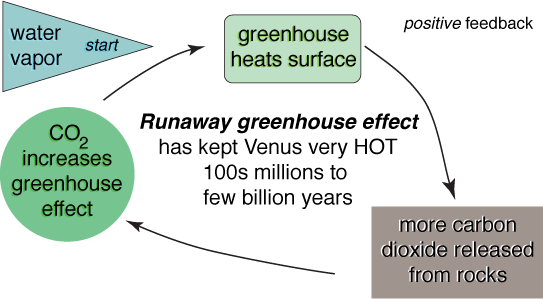Difference between ´greenhouse effect´ and ´runaway
greenhouse effect´?
The basic greenhouse effect works like this:-
- Short wavelength radiation from the sun, like visible
light, passes easily through the atmosphere and is absorbed by the land
and sea.
- There it gets re-radiated back as longer wavelength
infra-red (heat) radiation.
- This longer wavelength is blocked by certain gasses in
the atmosphere, like carbon dioxide, and stays, which raises the world´s
temperature.
- If we didn´t have a greenhouse effect the world would be
much, much colder, probably so cold the oceans would freeze over.
- So we need some level of greenhouse effect to keep the
planet habitable.
Now, the "runaway" greenhouse effect
is when the effect starts to be self-feeding, and the rising temperatures
add more gasses to the atmosphere, trapping more heat, raising the temperature
and so on.
If this happened it might not end with all the oceans evaporating, since the increased clouds could reflect a lot of solar energy back into space. But it would likely mean very much higher temperatures than we have now.
If this happened it might not end with all the oceans evaporating, since the increased clouds could reflect a lot of solar energy back into space. But it would likely mean very much higher temperatures than we have now.
Runaway Greenhouse effect
faced by VENUS
- Venus
was originally cooler than what it is now and it had a greater abundance
of water several billion years ago.
- Also,
most of its carbon dioxide was locked up in the rocks.
- Through
a process called as runaway greenhouse, Venus heated up to its
present blistering hot level.
- Because
Venus was slightly closer to the Sun than the Earth, its water never
liquified and remained in the atmosphere to start the greenhouse
heating.
- As
Venus heated up, some of the carbon dioxide in the rocks was "baked
out."
- The
increase of atmospheric carbon dioxide enhanced the greenhouse
heating.
- That
baked more carbon dioxide out of the rocks (as well as any water) and a
runaway positive feedback loop process occurred.
- This
positive feedback loop occurred several hundred million to a few billion
years ago so Venus has been very hot for that length of time.

- The loss of water from the rocks means that Venus' rocks
are harder than the rocks of Earth and its lithosphere is now probably too
thick and hard and its aesthenosphere is too poorly lubricated for plate
tectonics to occur.
- The water Venus originally had is now gone because of a
process called dissociation.
